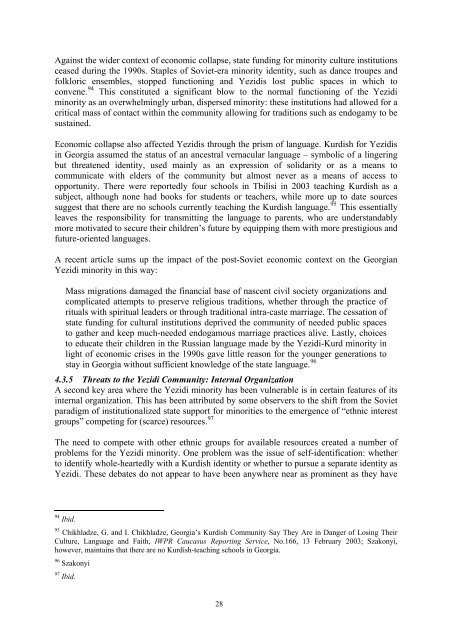The Human Rights situation of the Yezidi minority - UNHCR
The Human Rights situation of the Yezidi minority - UNHCR
The Human Rights situation of the Yezidi minority - UNHCR
Create successful ePaper yourself
Turn your PDF publications into a flip-book with our unique Google optimized e-Paper software.
Against <strong>the</strong> wider context <strong>of</strong> economic collapse, state funding for <strong>minority</strong> culture institutions<br />
ceased during <strong>the</strong> 1990s. Staples <strong>of</strong> Soviet-era <strong>minority</strong> identity, such as dance troupes and<br />
folkloric ensembles, stopped functioning and <strong>Yezidi</strong>s lost public spaces in which to<br />
convene. 94 This constituted a significant blow to <strong>the</strong> normal functioning <strong>of</strong> <strong>the</strong> <strong>Yezidi</strong><br />
<strong>minority</strong> as an overwhelmingly urban, dispersed <strong>minority</strong>: <strong>the</strong>se institutions had allowed for a<br />
critical mass <strong>of</strong> contact within <strong>the</strong> community allowing for traditions such as endogamy to be<br />
sustained.<br />
Economic collapse also affected <strong>Yezidi</strong>s through <strong>the</strong> prism <strong>of</strong> language. Kurdish for <strong>Yezidi</strong>s<br />
in Georgia assumed <strong>the</strong> status <strong>of</strong> an ancestral vernacular language – symbolic <strong>of</strong> a lingering<br />
but threatened identity, used mainly as an expression <strong>of</strong> solidarity or as a means to<br />
communicate with elders <strong>of</strong> <strong>the</strong> community but almost never as a means <strong>of</strong> access to<br />
opportunity. <strong>The</strong>re were reportedly four schools in Tbilisi in 2003 teaching Kurdish as a<br />
subject, although none had books for students or teachers, while more up to date sources<br />
suggest that <strong>the</strong>re are no schools currently teaching <strong>the</strong> Kurdish language. 95 This essentially<br />
leaves <strong>the</strong> responsibility for transmitting <strong>the</strong> language to parents, who are understandably<br />
more motivated to secure <strong>the</strong>ir children’s future by equipping <strong>the</strong>m with more prestigious and<br />
future-oriented languages.<br />
A recent article sums up <strong>the</strong> impact <strong>of</strong> <strong>the</strong> post-Soviet economic context on <strong>the</strong> Georgian<br />
<strong>Yezidi</strong> <strong>minority</strong> in this way:<br />
Mass migrations damaged <strong>the</strong> financial base <strong>of</strong> nascent civil society organizations and<br />
complicated attempts to preserve religious traditions, whe<strong>the</strong>r through <strong>the</strong> practice <strong>of</strong><br />
rituals with spiritual leaders or through traditional intra-caste marriage. <strong>The</strong> cessation <strong>of</strong><br />
state funding for cultural institutions deprived <strong>the</strong> community <strong>of</strong> needed public spaces<br />
to ga<strong>the</strong>r and keep much-needed endogamous marriage practices alive. Lastly, choices<br />
to educate <strong>the</strong>ir children in <strong>the</strong> Russian language made by <strong>the</strong> <strong>Yezidi</strong>-Kurd <strong>minority</strong> in<br />
light <strong>of</strong> economic crises in <strong>the</strong> 1990s gave little reason for <strong>the</strong> younger generations to<br />
stay in Georgia without sufficient knowledge <strong>of</strong> <strong>the</strong> state language. 96<br />
4.3.5 Threats to <strong>the</strong> <strong>Yezidi</strong> Community: Internal Organization<br />
A second key area where <strong>the</strong> <strong>Yezidi</strong> <strong>minority</strong> has been vulnerable is in certain features <strong>of</strong> its<br />
internal organization. This has been attributed by some observers to <strong>the</strong> shift from <strong>the</strong> Soviet<br />
paradigm <strong>of</strong> institutionalized state support for minorities to <strong>the</strong> emergence <strong>of</strong> “ethnic interest<br />
groups” competing for (scarce) resources. 97<br />
<strong>The</strong> need to compete with o<strong>the</strong>r ethnic groups for available resources created a number <strong>of</strong><br />
problems for <strong>the</strong> <strong>Yezidi</strong> <strong>minority</strong>. One problem was <strong>the</strong> issue <strong>of</strong> self-identification: whe<strong>the</strong>r<br />
to identify whole-heartedly with a Kurdish identity or whe<strong>the</strong>r to pursue a separate identity as<br />
<strong>Yezidi</strong>. <strong>The</strong>se debates do not appear to have been anywhere near as prominent as <strong>the</strong>y have<br />
94 Ibid.<br />
95 Chikhladze, G. and I. Chikhladze, Georgia’s Kurdish Community Say <strong>The</strong>y Are in Danger <strong>of</strong> Losing <strong>The</strong>ir<br />
Culture, Language and Faith, IWPR Caucasus Reporting Service, No.166, 13 February 2003; Szakonyi,<br />
however, maintains that <strong>the</strong>re are no Kurdish-teaching schools in Georgia.<br />
96 Szakonyi<br />
97 Ibid.<br />
28
















